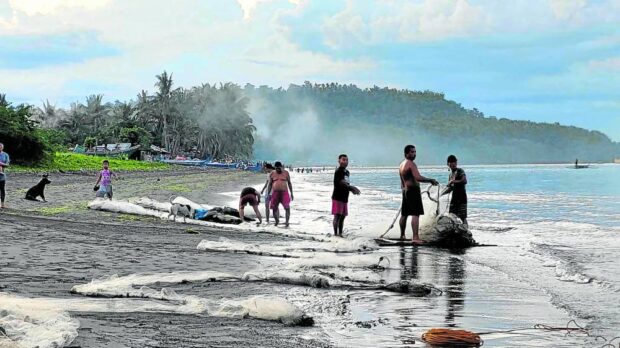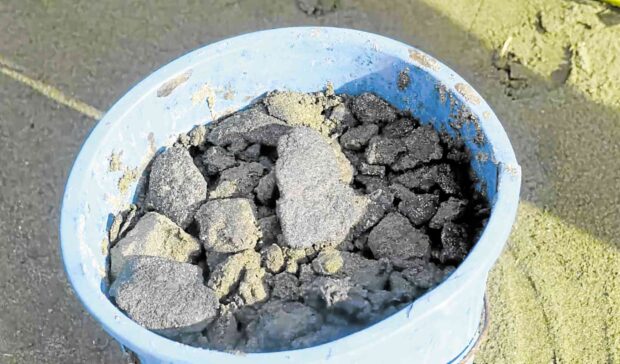Mindoro spill woes ‘far from over,’ says mayor

GONE FISHING | Fishermen in the City of Calapan pull their nets hoping to at least catch enough
fish to feed their families in this photo taken on July 9, weeks after the fishing ban, imposed
following the sinking of a fuel tanker off Oriental Mindoro in February, was lifted. (Photo by MADONNA T. VIROLA / Inquirer Southern Luzon)
MANILA, Philippines — The first marine environmental crisis under the Marcos administration is “far from over,” according to environmentalists and town officials of Pola in Oriental Mindoro province, as they continue to monitor oil residue in the town’s shorelines.
While the Philippine Coast Guard (PCG) had declared that oil removal and recovery operations had been completed, Pola Mayor Jennifer Cruz said she still saw huge tar balls, or lumps of solidified tar, when her team visited their town’s shorelines recently.
Cruz, in a press briefing on Wednesday, said she refused to sign the PCG’s declaration that the shorelines of Pola were 100 percent cleared of the oil spill, which came from the fuel tanker MT Princess Empress.
The vessel was carrying 800,000 liters of industrial oil when it sank off Naujan town, causing an oil spill that also affected the marine ecosystems and the livelihood of fishing communities in Oriental Mindoro, Palawan, Batangas, and Antique provinces.
Pola, Naujan’s neighboring town, was the hardest hit and had been declared the “ground zero” of the spill.
Article continues after this advertisement“We still need to clean up more areas. I’m not contesting the findings of other agencies but I can’t issue a clearance as long as I’m seeing oil residue in Pola,” Cruz said in Filipino.
Article continues after this advertisementThe mayor acknowledged that she was not an expert, but based on her observations, she said only around 50 percent of the spill had been cleaned up in her town.

A container of tarball fragments from the oil spill that were found on the shores of Pola town. (Photo from CEED and Protect VIP Network)
Environmental impact
Ivan Andres, head of the Oceans, Coastal Communities and Climate program of the Center for Energy, Ecology and Development (CEED), said his group conducted an assessment earlier this week and found oil residue along the shorelines of Pola adjacent to marine protected areas and fish sanctuaries.
According to Andres, they saw tarballs on Kabilang Ibayo beach and “fresh” oil residue in Barangay Puting Cacao.
He said they also monitored oil stones lodged between rocks and mangroves, as well as debris and litter covered in oil in the same area.
“Garbage, on its own, harms our environment. Now, we also need to deal with the impact of the oil spill,” Andres said.
A floating object found in Puting Cacao and within the St. John the Baptist fish sanctuary also showed accumulated oil residue beneath the material.
Andres pointed out that even while the MT Princess Empress had been emptied of its cargo, lingering impacts on water quality continue to threaten the ecosystems in the Verde Island Passage (VIP), the center of marine biodiversity in the world.
In discussions with fisherfolk groups in the capital city of Calapan, Andres said fishers were lamenting that there was less fish catch after the fishing ban was lifted.
“We are concerned that fishing bans were lifted with no guarantee of the consuming public’s safety due to the lack of public access to [the] results of water quality testing conducted by the Bureau of Fisheries and Aquatic Resources,” said Andres.
‘Hollow victory’
With President Marcos set to deliver the State of the Nation Address (Sona) on Monday, Fr. Edwin Gariguez, convener of the group Protect VIP, stressed that the government could not claim that it had completed the cleanup without accountability and concrete steps to prevent similar incidents.
“The [PCG] says that oil spill operations are over, and we are concerned that this will easily be considered a victory for the Marcos administration’s first environmental crisis as we approach Sona,” he said.
“But it is a hollow victory, as no one is held accountable and the government remains quiet about what it plans to do to prevent similar incidents in the future,” Gariguez added.